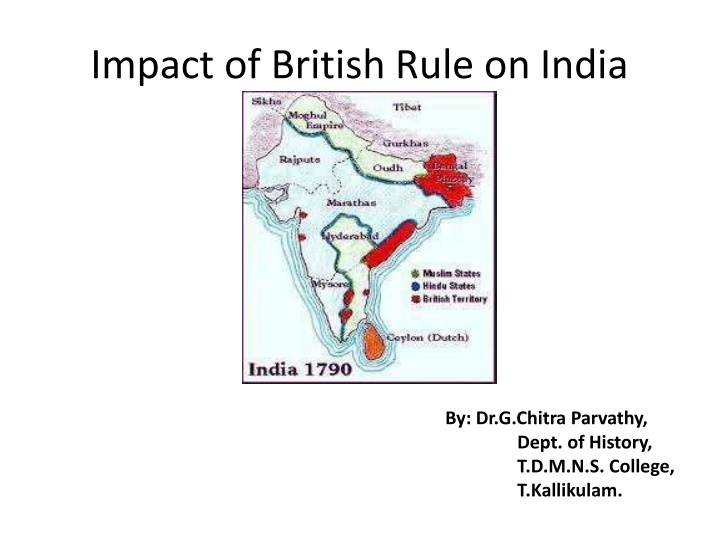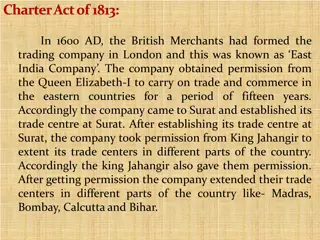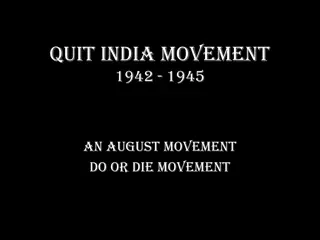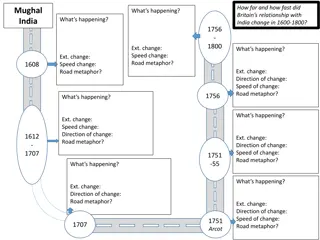
Impacts of British Rule on India: Control, Policies, and East India Company
Explore the lasting impacts of British rule on India, including their strategies for control, economic policies, and the dominance of the East India Company. Learn how British traders came to India, exploited resources, and established political influence through conflicts and alliances.
Download Presentation

Please find below an Image/Link to download the presentation.
The content on the website is provided AS IS for your information and personal use only. It may not be sold, licensed, or shared on other websites without obtaining consent from the author. If you encounter any issues during the download, it is possible that the publisher has removed the file from their server.
You are allowed to download the files provided on this website for personal or commercial use, subject to the condition that they are used lawfully. All files are the property of their respective owners.
The content on the website is provided AS IS for your information and personal use only. It may not be sold, licensed, or shared on other websites without obtaining consent from the author.
E N D
Presentation Transcript
Impact of British Rule on India By: Dr.G.Chitra Parvathy, Dept. of History, T.D.M.N.S. College, T.Kallikulam.
1. The British traders came to India for trading purpose. 2. The Industrial revolution led to a demand for raw materials in the factories in Britain. 3. Britain needed a market to sell its finished goods. 4. India was able to fulfil both the needs of Britain.
British establish their control overIndia 1. The British came to India for trading purpose. 2. During this period there was internal struggle in India. The Mughal power was declining. 3. This gave the British the chance to establish their control over India. 4. They did this through wars, treaties, annexations and alliances.
Policies the British used to establish control over the people of India 1. The new economic and administration policies. 2. Their land revenue policies helped them get large revenues in return. 3. They forced the farmers to grow cash crops and providing the raw materials for the factories in Britain. 4. They defeated their rivals and established political control over India. 5. They bought raw materials at low prices but the Indian weavers had to pay very high prices for the raw materials. 6. They put heavy duties on Indian goods entering Britain, so Indian exports were affected . 7. All these measures helped the British establish their control over India and her people.
The East India Company in 1600. It was supported by the British government
British gain control over Bengal After the battle of Plassey the British made Mir Jafar the Nawab of Bengal in return for money and territory. Mir Jafar was unable to pay the money so he was replaced by Mir Qasim. Mir Qasim was a strong ruler and he refused to make any further payments. So he was removed and Mir Jafar was made Nawab again.
Mir Qasim joined hands with Shiraj-ud-daula and the Mughal emperor Shah Allam II and fought a battle against the British (the battle of Buxar 1764). They were defeated and British gained control over Bengal.
Battles fought Anglo- Mysorewars Mysore was a powerful state under the leadership of Haider Ali and his son Tipu Sultan. Four wars were fought between the British and Mysore. Finally the fourth Anglo-Mysore 1799 ended with the heroic death and defeat of Tipu sultan. The British secured the ports of Coimbatore, Seringapatnam and Kanara.
Anglo- MarathaWars The Marathas were a strong power in the west. The fight for power among them gave the British a chance to come in between their internal matters. The Third Anglo-Maratha war was the last war between the British and the Peshwas. British defeated them and annexed their territories. The Peshwa was given pension and send off to Kanpur in Uttar Pradesh.
Anglo- Sikh Wars In North-West India, the Sikhs under Maharaja Ranjit Singh (1792-1839) became powerful. The British wanted to bring the Sikhs undercontrol. The British took advantage of the situation and the First Anglo-Sikh wars were fought. After the death ofMaharaja Ranjit Singh there was lawlessness in the region. In the second Anglo-Sikh war, the British defeated the Sikhs in the battle of Gujarat a town on river Chenab 1849. The Sikh chiefs surrendered and Punjab was annexed by Lord Dalhousie. Maharaja Dalip Singh was pensioned off and send to England.
The Subsidiary alliance introduced by the British in India In subsidiary alliance the Indian states that were under the British protection were : To suspend their army. To maintain the British army. To surrender their control on foreign affairs. Not allowed to make any alliance with other states. In return for all these the British would give them protection from their rivals.
The textile Industry : 1. Indian textiles such as cotton, linen, silk and woollen goods had markets in Asia and Africa. 2. With industrialisation in England, large scale production started in England with machines. And these were sold in India at cheap prices. 3. This threatened the Indian handloom industry. 4. British goods were allowed to enter India freely without any taxes. 5. Indian handicrafts were taxed heavily when exported. 6. India very soon became an importer of British clothes. 7. This affected the Indian handloom industry and left many unemployed. 8. The Indian handloom industry lost its domestic as well as foreign market.
Permanent Settlement:Lord Cornwallis Permanent Settlement: Lord Cornwallis introduced this in Bengal and Bihar in 1793. 1. The landlord or zamindar had to deposit afixed amount of money in the statetreasury. 2. In return for this they were recognised as hereditary owners of the land. 3. This revenue made the British financially secure and made the zamindar the owner of theland. 4. To get surplus revenue the zamindar forced the peasants to work harder and increaseproduction. 5. If the zamindar failed to pay the deposit theland would be sold off to another zamindar.
The British impact on society and culture When the British came to India they brought many changes and new ideas such as liberty, equality, freedom and human rights from the Renaissance and the Reformationmovements. These ideas led to several reforms in different parts of the country. Great Indian leaders like Raja Ram Mohan Roy, Sir Syed Ahmed Khan, Aruna Asaf Ali and Pandita Ramabhai were the fore runners of these reform movements.






















